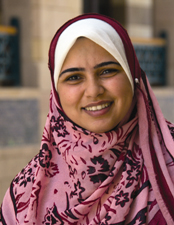|
“Cutting-Edge Cure” (page 20) highlights how graduate students and faculty members in AUC’s biotechnology program are researching treatment options for infections as well as viral and genetic diseases, including influenza, cancer and hepatitis C.While research has been carried out on these diseases in many parts of the world, the notable aspect about the work done at AUC is that it is focused on strains of the diseases found in Egypt. Current vaccines come from the United States and Europe, but the vaccines should be different in Egypt because the virus strains may be different.AUC researchers are working to combat the right strains and identify new ones to increase the effectiveness of the treatment. It may take years to achieve the desired results, but it makes me proud to know that some day, the treatment for strains of influenza particular to Egypt or for hepatitis C, of which Egypt has the highest infection rate in the world, may be the result of work done at AUC. Another example is in “Unlocking Arabic” (page 10). Justin Majzub (ALU ’84), who studied Arabic at AUC, was determined to help others learn the language he struggled with, and he spent more than 20 years developing a system to make learning Arabic simple, easy and fun. His system, Abjad, employs a cornucopia of products, including plastic letters that turn, swivel and click into various shapes, in the same way that Arabic letters take up different forms depending on where they are in the word. Majzub’s system is now widely used in Egypt, the Middle East and different parts of the world. His persistence and hard work have paid off, and children and adults alike are benefitting from the Abjad system. The type of research being done through AUC’s biotechnology program and Majzub’s Abjad system demonstrate that with patience and perseverance, you will get there.The key is to have the heart to follow through and not give up. |

